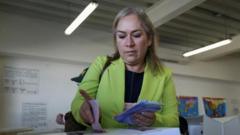Can a Lawyer Who Defended El Chapo Really Be Elected as Judge?

Understanding the Implications of Silvia Delgado's Election as Judge in Mexico's Judiciary Reform
In a significant development for the Mexican judiciary, former defense lawyer Silvia Delgado has been elected as a local criminal judge in Ciudad Juárez. This election is notable not only because of Delgado's controversial background, having previously defended infamous drug lord Joaquín "El Chapo" Guzmán, but also due to the broader implications of the first-ever judicial elections in Mexico. With a low voter turnout and accusations regarding candidates’ ties to organized crime, this election raises critical questions about the future of judicial independence and democracy in Mexico.
The Context of Judicial Elections in Mexico
Historically, the Mexican judiciary has faced criticism for its perceived lack of independence and accountability. The recent push for judicial elections emerged from a radical reform initiated by the governing Morena party. The intent behind this reform is clear: to democratize the judicial system by allowing citizens to vote for judges, including those in the Supreme Court. However, this approach has sparked a heated debate regarding the potential consequences for judicial integrity.
Supporters of the reform argue that by electing judges, the system becomes more responsive to the public, thus enhancing accountability. However, critics warn that this process may compromise the judiciary's independence, leading to potential favoritism or corruption.
Why Silvia Delgado's Election is Controversial
Silvia Delgado's election has become a focal point in discussions about the integrity of this new electoral system. Having served on the defense team for El Chapo, her candidacy was marked by accusations of having links to organized crime. Here are some key points that highlight the controversy surrounding her election:
- Defense of a Notorious Criminal: Delgado's role in defending El Chapo raises ethical questions about her suitability for a judicial position.
- Accusations of Organized Crime Links: A leading transparency organization suggested that Delgado was not alone among candidates with alleged ties to criminal organizations.
- Dismissal of Conflict of Interest: Delgado has vehemently denied any wrongdoing, asserting that her previous role was simply a part of her legal duty.
The Impact of Low Voter Turnout
The judicial election saw a turnout rate of only 13%, the lowest in any federal vote in Mexico's history. This low participation raises several questions about public trust in the electoral process and the judiciary. Many observers suggest that the low turnout indicates a general apathy among the Mexican populace regarding the election of judges. It also highlights the challenges faced by the government in implementing reforms that resonate with citizens.
President Claudia Sheinbaum, however, hailed the election as a success, emphasizing the importance of judicial reform. This discrepancy between the government's perspective and the public's engagement underscores the complexities involved in reshaping the judicial landscape.
Public Sentiment and the Future of Judicial Elections
Public sentiment regarding judicial elections is mixed. On one hand, there is a desire for a more democratic system that holds judges accountable to the people. On the other hand, the election of candidates with questionable backgrounds raises concerns about the integrity and independence of the judiciary.
As the judicial landscape evolves, it is crucial for the government to address public concerns and ensure that candidates for judicial positions are thoroughly vetted. This will help to bolster trust in the system and encourage greater participation in future elections.
Potential Risks and Benefits of Judicial Elections
Judicial elections in Mexico present both risks and benefits that must be carefully considered. Understanding these factors is essential for evaluating the effectiveness of this reform and its implications for the future of the Mexican judiciary.
Risks of Judicial Elections
- Political Influence: Elected judges may feel pressure to align with political parties or interests, undermining their impartiality.
- Voter Misinformation: Low voter turnout and a lack of informed choices can result in the election of unqualified candidates.
- Corruption Concerns: The potential for candidates with ties to organized crime to gain positions raises red flags regarding corruption.
Benefits of Judicial Elections
- Increased Accountability: Elected judges may be more responsive to the needs and concerns of the communities they serve.
- Public Engagement: Direct elections can foster greater public interest in the judicial system.
- Democratization of the Judiciary: Allowing citizens to elect judges can enhance the legitimacy of the judicial system.
Legal and Ethical Considerations
As the Mexican judicial system transitions into this new electoral framework, legal and ethical considerations must remain at the forefront. The following aspects warrant attention:
Legal Framework and Oversight
The establishment of a transparent legal framework is crucial for ensuring the integrity of judicial elections. This includes:
- Clear Regulations: Defining eligibility criteria and processes for vetting candidates can help mitigate risks.
- Oversight Mechanisms: Implementing independent bodies to oversee elections can enhance credibility.
Ethical Standards for Candidates
To maintain public trust, it is imperative to set high ethical standards for candidates seeking judicial positions. This includes:
- Background Checks: Thorough vetting processes can help identify candidates with potential conflicts of interest.
- Transparency in Campaigns: Candidates should be required to disclose their previous work and affiliations.
The Role of Society in Shaping Judicial Reform
As the Mexican judiciary undergoes transformation through elections, societal engagement will be critical. Citizens must take an active role in advocating for reforms that promote a fair and independent judicial system. This includes:
- Participating in Elections: Increased voter participation can strengthen the democratic process.
- Holding Leaders Accountable: Citizens should demand transparency and accountability from their elected officials.
Conclusion: The Path Forward for the Mexican Judiciary
The election of Silvia Delgado as a judge in Ciudad Juárez marks a pivotal moment in Mexico's judicial reform. While the move towards electing judges aims to enhance democracy, the controversy surrounding candidates and low voter turnout raises important questions about the future of the judiciary. As Mexico navigates this complex landscape, it is essential for citizens, lawmakers, and legal professionals to collaborate in fostering a judicial system that is both accountable and independent.
As the nation looks ahead, what steps can be taken to ensure that the judiciary remains a pillar of democracy and justice in Mexico? The future of judicial elections will depend on the collective efforts of society to uphold integrity and transparency in the legal system.
FAQs
What was the significance of Silvia Delgado's election as a judge?
Silvia Delgado's election is significant as it marks the first judicial election in Mexico, reflecting a radical reform aimed at democratizing the judiciary. Her controversial background as a defense lawyer for El Chapo raises critical questions about the integrity of the judicial system.
Why was voter turnout so low in the judicial elections?
Voter turnout was only 13%, the lowest in any federal vote in Mexico, indicating a lack of public enthusiasm for electing judges. Many observers believe this reflects broader apathy towards the electoral process and concerns about the candidates.
What are the potential risks of electing judges?
The potential risks include political influence over judicial decisions, voter misinformation leading to the election of unqualified candidates, and the possibility of corruption among candidates with ties to organized crime.
As we reflect on the future of judicial elections in Mexico, how can we ensure that the principles of justice and democracy are upheld? #JudicialReform #MexicoElections #ElChapo
Published: 2025-06-18 09:53:04 | Category: world



